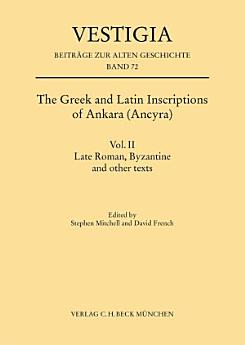The Greek and Latin Inscriptions of Ankara (Ancyra): Vol. II Late Roman, Byzantine and other texts
Stephen Mitchell · David French
May 2019 · C.H.Beck
Ebook
347
Pages
family_home
Eligible
info
reportRatings and reviews aren’t verified Learn More
About this ebook
The second volume of inscriptions from Ankara, ancient Ancyra, contains editions with commentary and full illustration of nearly two hundred inscriptions from the late Roman and Byzantine periods, and forty texts of Roman imperial date, more than half of which have not been published before, as well as inscriptions for Ancyrans found outside the city dating from the Hellenistic period to late antiquity. The inscriptions are introduced by a new survey of Ankara’s history from the third to the tenth centuries. An important group of inscriptions documents the building of Ancyra’s city walls. A new text suggests that the late Roman fortifications were erected in 267. The city was strategically and politically prominent in the fourth century, when it served as an imperial residence. After the mid-fifth century Ankara’s population was overwhelmingly Christian, and the city had a large monastic population. A monumental inscription states that Ancyra was called the city of the Theotokos. Three lengthy inscriptions present a remarkable collection of biblical and quasi-biblical exempla, depicting the lives of Old Testament figures as role models for Ancyra’s pious inhabitants. Against previous historical reconstructions, it appears that the late Roman city continued to be inhabited after the fall of Ancyra to the Sassanians in 622. The hypothesis that the famous Byzantine citadel dates to the seventh century is rejected in favour of construction in 859, under the emperor Michael III, when Ancyra was hailed as a new Jerusalem. Ancyra enjoyed a revival in the Middle Byzantine period. Inscriptions strengthen the arguments for dating the conversion of the famous imperial temple of Rome and Augustus into a church to the ninth, and the construction of the now destroyed Church of St Clement to the tenth century.
About the author
Stephen Mitchell, emeritus professor of ancient history at the University of Exeter, is Chairman of the British Institute at Ankara and a Fellow of the British Academy. His research has concentrated on the history, archaeology and epigraphy of Asia Minor with a recent emphasis on early Christianity and the religious traditions of Late Antiquity and the Byzantine period.
David French, who died in 2017, was the Director of the British Institute at Ankara from 1968 to 1994. His research interests and archaeological field work in Turkey ranged from prehistory to the Ottoman period, and culminated in a comprehensive topographical and epigraphical study of the Roman Roads and Milestones of Asia Minor.
David French, who died in 2017, was the Director of the British Institute at Ankara from 1968 to 1994. His research interests and archaeological field work in Turkey ranged from prehistory to the Ottoman period, and culminated in a comprehensive topographical and epigraphical study of the Roman Roads and Milestones of Asia Minor.
Rate this ebook
Tell us what you think.
Reading information
Smartphones and tablets
Install the Google Play Books app for Android and iPad/iPhone. It syncs automatically with your account and allows you to read online or offline wherever you are.
Laptops and computers
You can listen to audiobooks purchased on Google Play using your computer's web browser.
eReaders and other devices
To read on e-ink devices like Kobo eReaders, you'll need to download a file and transfer it to your device. Follow the detailed Help Center instructions to transfer the files to supported eReaders.








